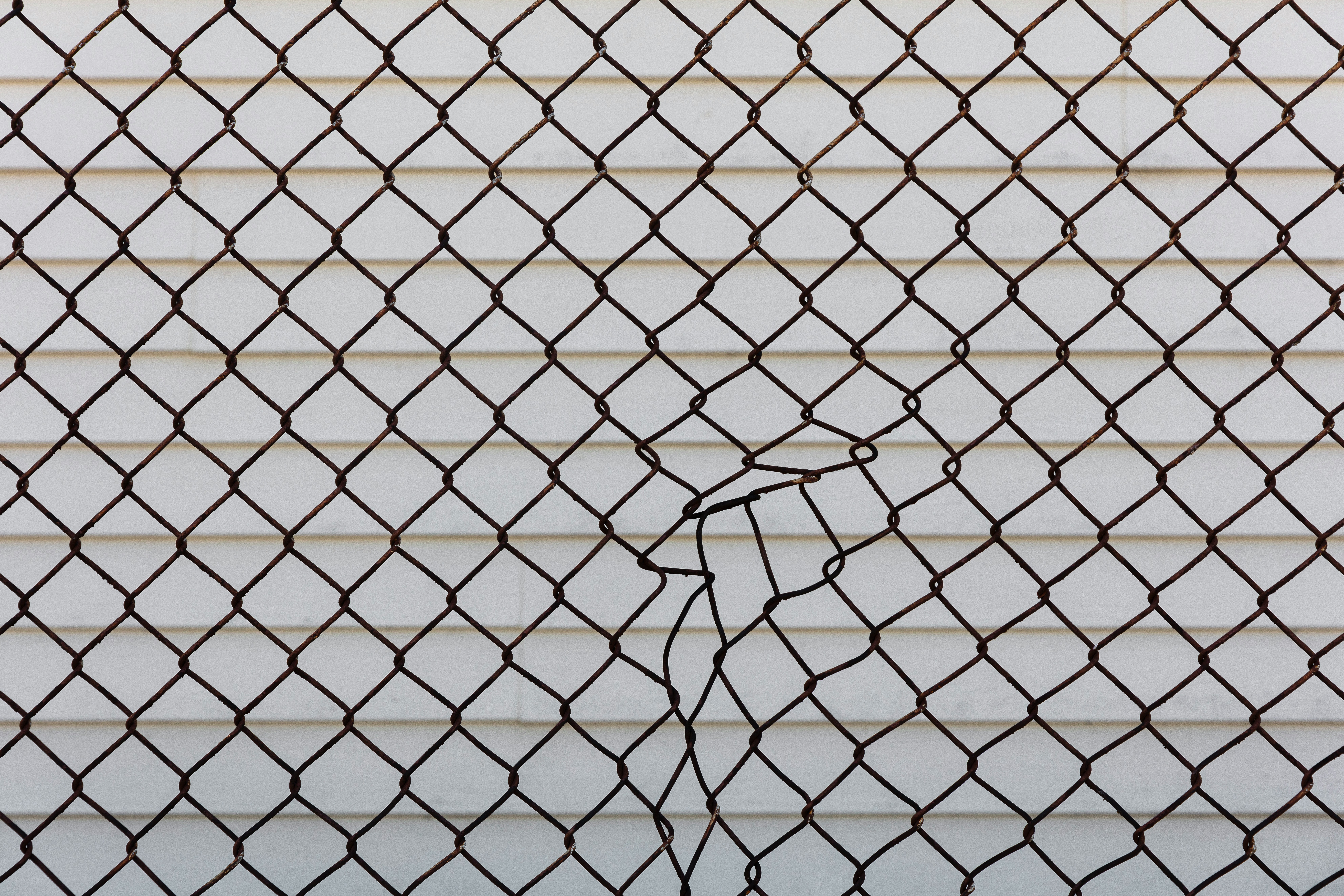The heat was brutal in the weeks before Ari was captured. Parched Goondiwindi soil baked in forty-degree days and denuded trees stood cemented in place by air that refused to move. Nothing moved in that heat. Nothing but the Southerners hitting a rare breach in the wall—they darted through the streets like wild rabbits, their noses full of danger’s musty stench.
#
I saw my first runner when I was twelve. I didn’t know why the man was running, his red-checked shirt untucked and flapping behind him like a cape, but I felt the atmosphere shift—the air charged with the same sort of static you get just before a thunderstorm. A group of local men sprinted after him, tackling him to the ground, his nose spraying blood on impact with the unforgiving bitumen. I glanced up at my dad, expecting to see my look of horror mirrored in his face, but finding something else entirely. He looked radiant in that moment, like one of the saints in the framed pictures Mum hung all around our fibro house—their eyes glistening and lips parted in the ecstasy of revelation.
“A man’s home is his fortress, Tessa,” he said, grabbing my hand and squeezing it. “And fortresses must be defended.”
#
Back in those days, Mum kept mostly to herself. In the mornings she tended the measly garden that wasted away out back, and every night she toiled in the kitchen to make sure Dad had a cooked meal waiting for him when he came home from patrol. We mostly ate in silence—Dad with his head in his phone, scrolling through the local crews’ newsfeeds for sighting updates; Mum pushing overcooked carrots and wilted broccoli around her plate. And me, watching them ignore each other and coexist all at once.
After dinner I would help Mum wash up—a simple task, but one I hated. It was hard to watch her and not think of the life she had settled for: a mostly empty four-bedroom, two-storey fibro; a rose garden of dead stems; an absent husband; a distant daughter.
Most nights the silence was broken by a knock at the front door. Usually it was Henry from across the road, looking for some company or asking for another patrol shift, but that night it was Evan. “Maree, grab us some beers,” Dad called from the living room, having already retired to his lounge while we washed and wiped dirty plates. Mum lifted her hands from the sink and started to pull the thick, latex gloves from her hands.
“I’ll get them,” I said, feeling guilty at the relief and gratitude in Mum’s eyes. It wasn’t for her sake that I escaped the oppression of that dingy kitchen.
#
“Word is there’s a caravan approaching by stealth, taking the old mine access road.” Evan sat on the three-seater lounge next to Dad’s armchair, arms folded across his chest and left knee bouncing energetically. Back at school he’d been a few grades ahead of me, and I’d always thought of him as quietly confident. But around Dad he got twitchy. Not nervous twitchy; eager twitchy.
“Reliable intel?” Dad leaned forward, eyes creasing in that way of his when he was cleaving the fat away from the story.
“Macca heard something…” Evan said reluctantly.
Dad grunted and fell back into the armchair. While Dad thought of Evan as “a good kid with a solid head on his shoulders,” Macca was more the stray dog he kept around because it was occasionally useful in a fight.
“Won’t hurt to set up a perimeter sweep,” Dad finally said, scratching at the faded Southern Cross tattoo on his forearm.
“I’ll go,” I said, too quickly, too loudly. I held my breath and watched the narrow range of emotions flit across Dad’s face; he didn’t like me patrolling, but if he didn’t rate the intel as credible, he wouldn’t see the harm in letting me go.
“No,” he eventually said, turning back to Evan. “Take Macca and Henry.”
#
I didn’t have to wait long to sneak out. Dad turned in first—“rested body, sharp mind”—and Mum followed as soon as her stories had ended. At that almost-midnight hour, the streets of Goondiwindi were quiet, but the heat still radiated from the bitumen that had spent the day baking. I found Evan, Macca, and Henry at the intersection of Bowen and McLean.
“It’s too late for you to be out, little bird.” Macca had a voice that was like claws on steel. The three boys were only a couple of years older than me, but being closer to twenty overinflated their confidence and stoked their misplaced arrogance. “Does daddy know you’re not in bed?”
“Leave off, Macca,” Evan said, fixing his scowl to the boy and then to me. “What are you doing here, Tessa?”
“I came to patrol.”
“You don’t have a uniform.”
“Don’t need a uniform to catch a runner.”
Didn’t matter that it was the truth; it could be a muggy thirty degrees in the middle of Goondiwindi and Dad’s crew would be dressed like they were patrolling the Antarctic. I’d given up making fun of it. “Uniforms are important, Tessa,” Dad would say. “They declare we are one, we have a purpose, we are to be respected.”
He spouted those self-fashioned proverbs all the time: “A wall is only as strong as its weakest point;” “A citizen’s rights are only protected to the extent his duties are fulfilled;” “The only good Southerner is one in chains—in the stocks or in the bed.”
Mum hated that last one. She’d scowl at the old man, pressing her lips together and making a noise that reminded me of a possum growling—all sound, no substance. She’d made the same noise when I told her I wanted to drop out of school and join Dad’s patrol crew.
“Go home, Tessa.” Evan said.
Macca sneered, his face twisting in a way that turned it from dumb to cruel. “Back to your cage, little bird.”
I flipped him the finger and turned on my heel, ignoring the hoots and catcalls that followed. I didn’t need to patrol with them, anyway—most crews thought the wall was only vulnerable at the edge of town, but there were other places. Places that a caravan couldn’t pass through, but that could hide a lone runner.
#
There weren’t always runners, just like there wasn’t always a wall. There was a time that Goondiwindi was just another no-nothing, forgotten country town. Not that I remembered it.
I should’ve had memories of it, of a wide open space stretching from the MacIintyre River to the horizon—it’s not like I was too young when it all began, or the building of the wall was too long ago…Plus I had other memories from that time: birthday parties, school exams, trips to nearby Dalby. But, when I tried to picture what it was like before the wall and the runners, I couldn’t form the images in my mind. It’s as if the wall interrupted my consciousness as much as it has the Goondiwindi landscape.
#
After an hour of searching, I found a breach near the old petrol station; just a few links cut in the chain fence—not enough to be noticeable unless you were looking for it. When I was younger, the petrol station had also served as the local convenience store and the post office. Dad used to buy me an ice cream with the left-over change after filling up the ute and then he would backhand me when I’d let it drip on the seat during the journey home. But it had been years since the petrol pumps were last full; town life had gravitated north, leaving the station behind in a strange limbo. Now, woody stems of long-dead weeds punched through the cracks in the concrete pad, rust corrupted the metal bowsers and poles, and everything was cast in the garish light of fluorescent tubes that were kept on to discourage runners.
There was no way to tell whether the breach was old, but I wasn’t ready to head back to the silent boredom of home, so I started my sweep. I walked slowly, stalking the nearby streets like so many feral cats around town. Overhead, dark shadows swirled in a darker sky, and the stirrings of a new breeze whistled an unfamiliar tune in my ears. The warm air was heavy with an unfamiliar scent—not the dusty tickle I was used to, but something dense and sweeter. My mind took on that half-aware state, distracted by the breeze and lulled into complacency by the familiar surroundings and the resignation that my search wouldn’t find anything.
I would have found him earlier if I’d been paying attention; would have picked up on the splatter of blood on the sidewalk, or the laboured breathing and soft, pitiful moaning. In the end, it was the smell—a bitter and pungent reek—that gave him away.
“Please,” he mumbled when I found him, hidden behind a corroded dumpster. “Help me.”
He was maybe three years older than me and had the look of all Southerners: pale skin, dark hair, and sunken eyes that darted too rapidly. A wound at his leg bled freely, from the broken chain fence or some other obstacle on his journey north, but it wasn’t enough to disable him. He had collapsed from something more basic—exhaustion, dehydration, or fear.
“Quick,” I said, my voice trembling with adrenaline. “There are patrols scouting. We need to move.”
The boy struggled to escape the small confines, the dumpster shrieking as he wriggled and scrabbled to get up. He reached out for my help and my skin tingled as I grasped his hand and pulled him to his feet. He stumbled into me, threatening to send us both crashing to the ground. I bit down a curse and let him prop himself against my side.
I led him along the streets and avenues I knew would be quiet. He mumbled his thank-yous over and over in between soft groans. And all the way back home, my heart fluttered with an excruciating tension.
#
Evan wasn’t there when I led the boy up the back steps and into the kitchen; just Dad, sitting at the table, scrolling through his phone and eating leftover pie with vanilla ice cream. He looked up at as the door banged back into place and I waited for his eyes to light up with pride or excitement or gratitude.
“Where’s Evan?”
The wind coursed through the flyscreen, setting the door rattling. My heart turned a little cold. “Still out with Macca and Henry. They didn’t want me to patrol with them.”
The boy next to me startled at that. He threw me an anguished look and took a step back, but Dad was quicker. Leaping from the table, he grabbed the boy by the wrist and twisted it roughly behind his back. “Go find them,” Dad ordered, pushing the boy to the table. “And tell them to hurry back.”
I nodded mutely, flushing with the heat of anger and disappointment. The sound of footfalls in the hallway announced Mum before she stuck her head into the kitchen. “What’s going on?” she asked groggily, her eyes widening at the sight of Dad manhandling the boy. “Les, what are you doing?”
Dad shook his head in that way of his to ward off stupid or unnecessary discussion. “Get the cable ties.” Mum opened her mouth to protest. “I don’t want to hear it, Maree,” he shouted, sending Mum rigid and the boy cowering. “Get the bloody cable ties. And, Tessa, for the love of God, why are you still here? Go and get the boys.”
#
The wind outside had grown stronger, sending my hair flying around to whip at my face. The sound of Dad shouting followed me all the way down the street, pushing me to run faster and faster until it got lost in the swirling wind, the blood pumping in my ears, and the heavy thud of my Dunlop volleys on the sticky bitumen.
At first I thought the growing rumbling was a distant vehicle—a supply delivery truck from Brisbane, or a roaming petrol tanker. And then I felt it—a big fat drop exploding on my bare shoulder. And then another. I stopped in my tracks, my urgency forgotten, and stared up at the sky. The full moon was gone, hidden behind menacing clouds that swirled and rolled like a pit of snakes, lit only by the flashes of lightning at its edges. The wind was howling now. And, with a crack that exploded and reverberated around the street, the heavens split open and rain fell in a torrent.
I broke out of my stupor and resumed running, my breathing laboured and my chest tight. It had been a decade since Goondiwindi had last seen rain, and now that it was back I didn’t know what to think of it—was it was the rain of benediction, or a deluge to punish us all?
#
“Where is everyone?” I asked Mum when I returned home. She sat at the kitchen table where Dad had been just a couple of hours ago, her dressing gown pulled tight around her shoulders and a half-empty cup of coffee cradled in her shaking hands. I half expected her to yell at me for tracking wet puddles across the floor, but she barely glanced up at me.
“Mum!”
She startled and looked over at me. “Tessa, you’re wet.”
“Where’s Dad?” And Evan, and Macca and Henry. I hadn’t found them on the usual patrol route, so I’d assumed they’d found their way back to the house.
Mum’s mouth opened and then shut and then opened again; a gaping fish drowning in nothing but air. She stared down at her cup and I wondered how long she had been sitting there, staring at nothing, letting her coffee go cold.
“In the shed,” she finally answered, keeping her gaze down.
Thunder boomed overhead, rattling the windows in their panes. Mum gripped her cup tighter, her brown skin paling in a poor approximation of a white-skinned southerner. I left her and stepped back out into the wind and rain.
The garden shed was tucked away in the back corner of the yard, a neglected assemblage of fibro panels and corrugated iron. Usually, the door was held shut by a simple bolt lock to keep vermin out, but tonight it was propped open by a jagged half-brick and banging loudly against the shed’s fibro shell. Bang, bang, bang.
Inside, a wall of khaki uniforms blocked the view. I should have turned back then and gone inside. I was getting soaked and there was little chance that Dad and his patrol crew would make room for me, but I was loathe to join Mum in her cold quiet and despair. Thunder boomed overhead and Evan looked over his shoulder. He frowned at me and shook his head—“Go inside, Tessa, this is not for you”—but my gaze slid past him and to the boy tied to one of the kitchen chairs.
He had been pathetic when I’d first found him, but now he was broken; his nose mashed against his face, blood dribbling from his chin and splattering on his shirt, his left eye a purple bruise above a shattered cheek. And my gut twisted, the earlier elation congealing into something bitter, settling like concrete in my belly and coating my tongue with sand.
#
That night the flood rains came to Goondiwindi. At around two a.m. the power in the town went out. I know because when it finally came on the next morning, my alarm clock flashed the same time over and over again. As if time could be altered as easily as pushing the reset button on some cheap plastic. I pulled the cord from the wall socket and erased the display altogether.
#
The Southerner looked younger the next time I saw him, younger maybe even than me—not that I’d ever worn my fifteen-year-old body easily. Dad and his crew had moved him from the garden shed (which had flooded along with every other ground floor in Goondiwindi), to Mum’s sewing room. He’d sat there tied to a kitchen chair for the last three days. With the power still out, the roads cut off, and the authorities still days away in Dalby, our house had turned into a detention centre. For the boy and for me.
He looked up as I entered the room through the small window above Mum’s sewing table. Even though my room was only next door, I’d had to climb out of the bathroom window down the hallway and inch along the narrow eaves. Dad and the rest of his crew were out helping those stranded and injured—“fulfilling our civic duty”—leaving Macca behind to guard the runner. If it had been Henry or Evan outside the door, I never would have tried, but Macca was lazy and arrogant. He was probably sleeping or watching porn on his phone.
Even so, I made sure I was quiet when I stepped down on to the table littered with scraps of fabric and little plastic boxes of buttons and pins. Fleetingly, I remembered standing beside Mum at the same table as she sewed the new zipper on my second-hand school uniform.
The boy stared at me with his wide grey eyes, his face mottled and swollen into a caricature. My stomach tightened at the sight of it. He moaned, the same chest-clenching, pitiable sound I heard each night through the thin wall that separated our rooms. I put my finger to my lips, signalling for him to stay quiet as I clambered down from the table and stepped bare-footed onto the worn carpet. With the rain no longer slamming on the roof or crashing against the windows, the house had turned quiet again, strangled in the grasp of the tension and violence that had sprung up under its corrugated roof.
I told myself that I had come to ease my conscience, the bottle of tap water I’d stolen from the bathroom cabinet tucked securely in the waistband of my shorts. Mum had started hoarding it when the rains had started and we’d all made fun of her—why hoard water when it was pissing down outside? But then the rain had stopped and the power had died, and although the cruel jests had tapered off and everyone had grabbed their bottle of water stashed in perfect order under the bathroom sink, no one had uttered a “thank you”, or a more dignifying “sorry.”
I stepped forward and stopped. Took a breath. Lifted my foot to take another step. And stopped. My mind was struggling with the realisation that a different world stood just beyond the precipice. A precipice that fell just a few steps between me and the boy strapped to a kitchen chair.
“You make a sound,” I rasped, low and desperate, “and I’ll leave.”
He nodded, a subtle dip of his head, and closed his eyes. Maybe, like me, he hoped the terrors of this new world could disappear just by closing his eyes.
Taking another breath, I stepped forward. And this time, I didn’t stop. He didn’t move as my trembling hands untied the gag knotted at the back of his head. Strands of greasy hair grazed my fingers as the fabric came away in my hand. I passed the bottle of water over his shoulder, flushing again as his bound hands came up to take it from my grasp. He downed the bottle in a matter of seconds, his breath heaving and his throat gagging in a fit that threatened to destroy us both.
I stared at the thin plywood door, waiting for Macca to storm through in a mind to vent some overdue aggression. My heart thundered with the fear and anticipation. But there was no god-almighty crash, no splintering of wood, no fists thrown into unprotected and already-bruised flesh. Slowly, my breathing returned to normal. I stared at my hands, willing them to move. They trembled as I reached up to return the gag, and I shuddered as the manky material settled all-too-comfortably back into the boy’s mouth.
I went to step away, but the boy’s moaning drifted to me through the gag. His eyes were darker, no longer wide orbs of terror. He moaned again, softer, more insistent. Despite my misgivings, I tugged on the fabric, loosening it from his mouth. And not once did his eyes deviate from mine.
“My name is Ari,” he whispered.
It shouldn’t have made a difference. It was just a word. Three simple letters. But knowing his name changed the way I looked at him.
I took the empty bottle from him, realised how parched my own mouth had become, and flinched as though scalded when his hand grazed mine. Quickly, I pulled his gag back into place. He didn’t moan again, and as soon as it was done I averted my eyes. On shaking legs, I moved back to the sewing table, and looked back only when the window was dropped into place and the warped glass made the boy appear more like a waking dream.
#
I went back to the sewing room three more times that week, taking Ari scraps of food from rapidly dwindling cupboard stores, and staying only as long as it took him to wolf down the meagre offerings. He never said anything while his gag was removed and I never invited the opportunity. It was hard enough to meet those grey eyes and not feel the knife of shame twist again in my own empty belly. Every time I went into that room, I came out with part of the old me left behind. Like a red-bellied black sloughing off layers of skin.
#
In the beginning, after the rain had stopped and the stormwaters finally receded, there had been some rejoicing in the town—the strange excitement was over and people were happy at the prospect of life returning to normal. But then the days dragged on, and the roads were still closed, and no trucks had been seen within a fifty-kilometre radius of town. Goondiwindi had become an island—cut off from the rest of the world, adrift and uncertain. And that made people edgy.
Dad was on his phone constantly when he was home, which wasn’t often, trying to contact the authorities for a new ETA, trying to calm the townspeople on the other end of the line and then yelling and swearing at them when that didn’t work. Evan, Henry, and Macca were always lurking; to the point it started to feel more like their home than mine. I’d hear them talk about what was happening in town, their voices full of agitation and frustrated machismo, their half-conversations full of bloated bodies found piled against the wall where the waters had dragged them.
And in between the phone calls, the overheard conversations, and Ari’s moaning, were the fights. I’d never heard my parents raise their voices at each other before Ari’s arrival, let alone trade insults and obscenities. But, in the really late hours, after Dad’s crew had finally left for the night, I’d hear it unravel. It was never clear whose words triggered the deluge, but I’d always hear Dad’s voice first. Always shouting the same inane, nonsensical, idiotic polemics that had once sounded profound to my childish ears.
Mum wasn’t buying it anymore, either; her normally deep, husky voice became reedy and shrill, piercing the thin walls of the house like bullets. “He’s just a child! You can’t leave him chained in there forever!” “Well then stop fucking feeding him Maree!” “I’m not feeding him! Your brainwashed lackeys won’t let me through the door to my own sewing room!”
And so it would go. I started waiting until Dad left the house in the morning before creeping downstairs. And there would be Mum, sitting at the kitchen table in her threadbare terry-towelling dressing gown, wearing her bloodshot eyes and dishevelled hair like a queen.
On the morning the lynch mob turned up, we were both sitting at the table staring grimly at uneaten pancakes made from stale flour and our last carton of long-life milk. I heard Macca’s voice first, shouting something offensive as he always did, and thought nothing of it. But then the chorus of voices joined in: “We want the boy. The boy is ours.”
I didn’t bother running to the bathroom, just barrelled straight into Mum’s sewing room and past Ari still tied to his chair. I reefed at drawers and boxes, sending pins and ribbons and buttons scattering to the floor until I found the scissors. Outside, the noise was growing. I hacked at the cable ties with the blunt blades; it had been years since Mum had sewn anything beyond a few hems. Footsteps on the stairs outside made me pause for just a second, my gaze flitting from Ari’s bound hands to the hallway.
Mum appeared in the doorway. “Get him out of here,” she said urgently. “I’ll do what I can to distract them.”
The last cable tie surrendered with a snap like a broken bone. His hands free, Ari ripped the gag from his mouth. Just like I had the first night I climbed through the window, I ordered him to be quiet, and then led him to the bathroom. The eaves that led between it and the sewing room also connected to the garage. We half-scrambled, half-stumbled our way onto its rusted corrugated iron roof, and then rolled from it to the rain-sodden earth below. Ari grunted loudly, but the noise was lost amongst the feverish chanting of the crowd on the other side of the house.
“Run,” I said. And he fumbled his way to his feet and followed me through Goondiwindi’s back streets to the destitute petrol station not five hundred metres from where I’d first discovered him.
#
We hid in the roof cavity. Ari had climbed on the urinal to open a ceiling panel, and pulled me up after him. In the first hour we heard the mob break the rest of the half-shattered windows and scour the interior. Ari gripped my hand tight and I wasn’t sure if it was from fear or a misplaced sense of protection. I wasn’t sure of much anymore; only sure of the rush of heat that I hoped was the retreat of my debilitating guilt.
Later, we sweated together under the midday sun, clinging to the shadows and avoiding the bright patches of light that pooled under a broken roof. There were a hundred questions I wanted to ask him—Had he arrived alone? Was there someone out there looking for him? Someone worried for him? What had he thought he would find beyond the dry bed of the MacIntyre that would make life better? A hundred questions, and a hundred more.
“You could go back,” I murmured to him. “Through the breach in the wall—you could go back through and get away.” It was so close, and even with his injuries we could make it without being caught. It would be dangerous for him, making the journey alone and injured, and the wild dogs would quickly catch the scent of his wounds. But it wouldn’t be any more dangerous than staying, and the wild dogs of Goondiwindi were already barking for his blood.
Ari shook his head and grimaced, the bruises on his face rippling with the tiny gesture. “If there was something to go back to, I wouldn’t have left.”
#
The day stretched long and slow before shadows lengthened under a flame-red sky. We slept in fits, huddled together as the world around us turned dark, and shivering despite the muggy conditions in the cramped space. The roof had fallen apart in the recent storm, and with the rain clouds gone and the town lights out, there was nothing to stop the constellations from pressing down on us.
“I wished on that star.” Ari’s feverish body shifted next to mine as he pointed at a bright orange star below a cluster of three smaller blue. “That was the star that brought me here.”
#
The next morning they found us. Men not in the khaki uniforms of my Dad’s crew, but the navy blue of BorderForce, with their stern faces and infrared technology. They yanked us from our hiding place, our bodies crashing on the tiles below where they kicked and spat at us. “I’m a Northerner! I’m a Northerner!” I cried over and over—the shame of which was eclipsed in that moment by the pain, but which would grow to consume me in the following weeks.
Ari was silent, save a few grunts and groans as the blows landed. They hauled him to his feet and dragged him away, leaving me bloodied and alone on the floor of the petrol station toilet. I waited until evening to pick myself up and venture outside. The lights of delivery trucks glowed on the horizon and the static of electricity buzzed overhead. I took the long way back, avoiding the main streets and spots along the wall where Dad’s crew patrolled. The closer I got to home, the lonelier I felt. A deep, cold hollowness.
The crowd had dispersed from the lawn, leaving nothing but a muddied mess of broken stems and deep tracks. Lights from nearby houses cast my shadow in triplicate, but our house was dark. Inside, Mum sat at the kitchen table, surrounded by the smell of damp carpet and rotting wood, nursing a coffee mug and a black eye. I sat down beside her. She didn’t look up at me as I reached over and laid my hand on hers.
We stayed like that, sitting in silence, as the night deepened and engulfed us both.




